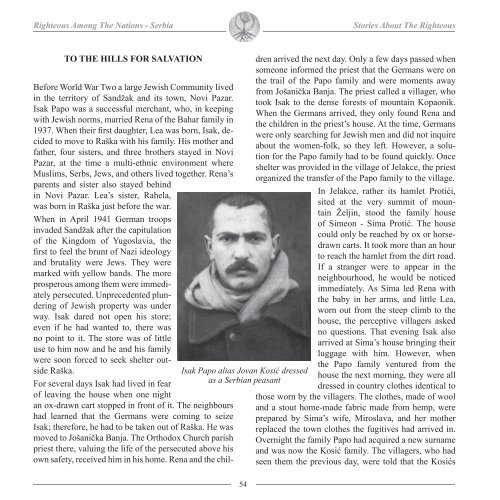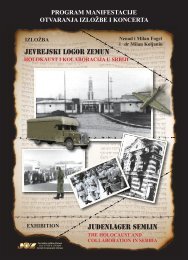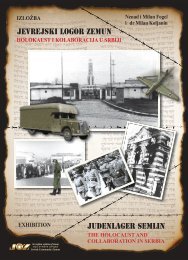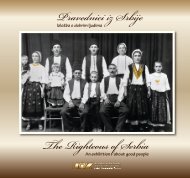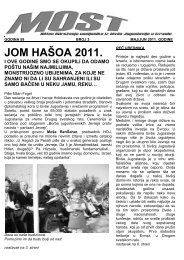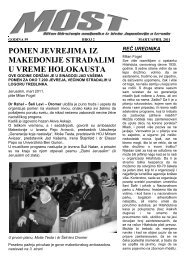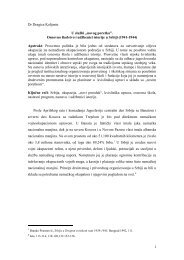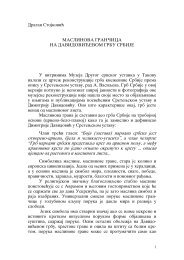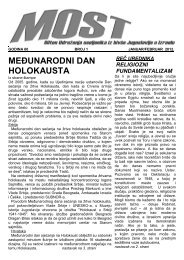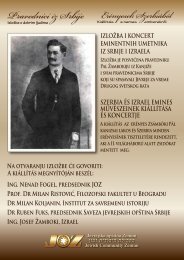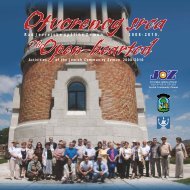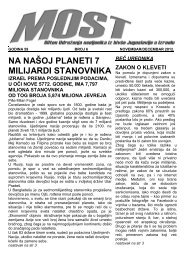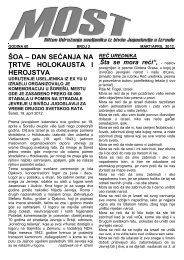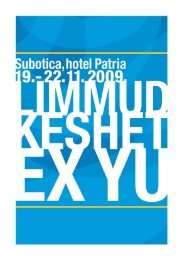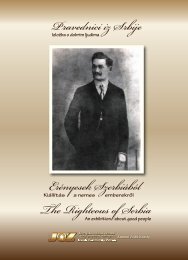Book on the Righteous - Jevrejska opština Zemun
Book on the Righteous - Jevrejska opština Zemun
Book on the Righteous - Jevrejska opština Zemun
Create successful ePaper yourself
Turn your PDF publications into a flip-book with our unique Google optimized e-Paper software.
<strong>Righteous</strong> Am<strong>on</strong>g The Nati<strong>on</strong>s - Serbia<br />
Stories About The <strong>Righteous</strong><br />
TO THE HILLS FOR SALVATION<br />
Before World War Two a large Jewish Community lived<br />
in <strong>the</strong> territory of Sandžak and its town, Novi Pazar.<br />
Isak Papo was a successful merchant, who, in keeping<br />
with Jewish norms, married Rena of <strong>the</strong> Bahar family in<br />
1937. When <strong>the</strong>ir first daughter, Lea was born, Isak, decided<br />
to move to Raška with his family. His mo<strong>the</strong>r and<br />
fa<strong>the</strong>r, four sisters, and three bro<strong>the</strong>rs stayed in Novi<br />
Pazar, at <strong>the</strong> time a multi-ethnic envir<strong>on</strong>ment where<br />
Muslims, Serbs, Jews, and o<strong>the</strong>rs lived toge<strong>the</strong>r. Rena’s<br />
parents and sister also stayed behind<br />
in Novi Pazar. Lea’s sister, Rahela,<br />
was born in Raška just before <strong>the</strong> war.<br />
When in April 1941 German troops<br />
invaded Sandžak after <strong>the</strong> capitulati<strong>on</strong><br />
of <strong>the</strong> Kingdom of Yugoslavia, <strong>the</strong><br />
first to feel <strong>the</strong> brunt of Nazi ideology<br />
and brutality were Jews. They were<br />
marked with yellow bands. The more<br />
prosperous am<strong>on</strong>g <strong>the</strong>m were immediately<br />
persecuted. Unprecedented plundering<br />
of Jewish property was under<br />
way. Isak dared not open his store;<br />
even if he had wanted to, <strong>the</strong>re was<br />
no point to it. The store was of little<br />
use to him now and he and his family<br />
were so<strong>on</strong> forced to seek shelter outside<br />
Raška.<br />
For several days Isak had lived in fear<br />
of leaving <strong>the</strong> house when <strong>on</strong>e night<br />
an ox-drawn cart stopped in fr<strong>on</strong>t of it. The neighbours<br />
had learned that <strong>the</strong> Germans were coming to seize<br />
Isak; <strong>the</strong>refore, he had to be taken out of Raška. He was<br />
moved to Jošanička Banja. The Orthodox Church parish<br />
priest <strong>the</strong>re, valuing <strong>the</strong> life of <strong>the</strong> persecuted above his<br />
own safety, received him in his home. Rena and <strong>the</strong> chil-<br />
Isak Papo alias Jovan Kosić dressed<br />
as a Serbian peasant<br />
54<br />
dren arrived <strong>the</strong> next day. Only a few days passed when<br />
some<strong>on</strong>e informed <strong>the</strong> priest that <strong>the</strong> Germans were <strong>on</strong><br />
<strong>the</strong> trail of <strong>the</strong> Papo family and were moments away<br />
from Jošanička Banja. The priest called a villager, who<br />
took Isak to <strong>the</strong> dense forests of mountain Kopa<strong>on</strong>ik.<br />
When <strong>the</strong> Germans arrived, <strong>the</strong>y <strong>on</strong>ly found Rena and<br />
<strong>the</strong> children in <strong>the</strong> priest’s house. At <strong>the</strong> time, Germans<br />
were <strong>on</strong>ly searching for Jewish men and did not inquire<br />
about <strong>the</strong> women-folk, so <strong>the</strong>y left. However, a soluti<strong>on</strong><br />
for <strong>the</strong> Papo family had to be found quickly. Once<br />
shelter was provided in <strong>the</strong> village of Jelakce, <strong>the</strong> priest<br />
organized <strong>the</strong> transfer of <strong>the</strong> Papo family to <strong>the</strong> village.<br />
In Jelakce, ra<strong>the</strong>r its hamlet Protići,<br />
sited at <strong>the</strong> very summit of mountain<br />
Željin, stood <strong>the</strong> family house<br />
of Sime<strong>on</strong> - Sima Protić. The house<br />
could <strong>on</strong>ly be reached by ox or horsedrawn<br />
carts. It took more than an hour<br />
to reach <strong>the</strong> hamlet from <strong>the</strong> dirt road.<br />
If a stranger were to appear in <strong>the</strong><br />
neighbourhood, he would be noticed<br />
immediately. As Sima led Rena with<br />
<strong>the</strong> baby in her arms, and little Lea,<br />
worn out from <strong>the</strong> steep climb to <strong>the</strong><br />
house, <strong>the</strong> perceptive villagers asked<br />
no questi<strong>on</strong>s. That evening Isak also<br />
arrived at Sima’s house bringing <strong>the</strong>ir<br />
luggage with him. However, when<br />
<strong>the</strong> Papo family ventured from <strong>the</strong><br />
house <strong>the</strong> next morning, <strong>the</strong>y were all<br />
dressed in country clo<strong>the</strong>s identical to<br />
those worn by <strong>the</strong> villagers. The clo<strong>the</strong>s, made of wool<br />
and a stout home-made fabric made from hemp, were<br />
prepared by Sima’s wife, Miroslava, and her mo<strong>the</strong>r<br />
replaced <strong>the</strong> town clo<strong>the</strong>s <strong>the</strong> fugitives had arrived in.<br />
Overnight <strong>the</strong> family Papo had acquired a new surname<br />
and was now <strong>the</strong> Kosić family. The villagers, who had<br />
seen <strong>the</strong>m <strong>the</strong> previous day, were told that <strong>the</strong> Kosićs


